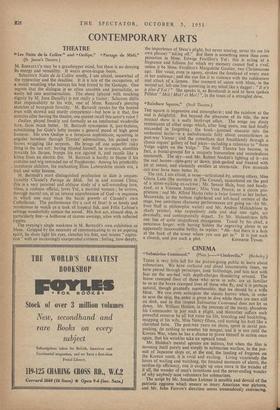CONTEMPORARY ARTS
THEATRE
k.lcs Nuits de la Co!ere" and "Oedipe." "Partage de Midi." (St. James's Theatre.) M. BARRAULT'S may be a grasshopper mind, but there is no denying Its energy and versatility. It wears seven-league boots. Salacrou's Nulls de la Colere smells, I am afraid, somewhat of the typewriter and the deadline. It is a tale of the occupation, of a moral weakling who betrays his best friend to the Gestapo. One regrets that the dialogue is so often unsubtle and journalistic, so easily led into sentimentalism. The sheep (played with touching dignity by M. Jean Desailly) is not really a traitor: Salacrou shifts that responsibility to his wife, one of Mme. Renaud's piercing sketches of bourgeois frivolity. M. Barrault speaks for the hunted 31,an with shrewd and sturdy competence—but how is it that, five minutes after leaving the theatre, one cannot recall this actor's voice 7 Ocdipe, played frankly and formally as an intellectual vaudeville turn, fares much better. M. Barrault syncopates it, jazz-fashion, substituting for Gide's lofty ironies a general mood of high good humour. His own Oedipe is a ferocious sophisticate, squatting in angular boredom through Tiresias' admonitions, his pained eye- brows wriggling like serpents. He brings off one superbly risky thing in the last act: having blinded himself, he re-enters, stumbles towards his throne, bumps his eye against it, and recoils like a kitten from an electric fire. M. Barrault is hardly to blame if his costume and wig reminded me of Pocahontas. Among his prankishly incestuous children, the enchanting Elina Labourdette stands out, a frail and witty Ismene. M. BarranIt's most distinguished production to date is unques- tionably Claudel's Partage de Midi. Set in and around China, this is a very personal and oblique study of a self-wounding love. Mesa, a customs official, loves Yse, a married woman ; he arrives, through mortal sin, at an intense apprehension of God—a sequence in which one may trace the harsh growth of Claudel's own Catholicism. The performance (by a cast of four) is as lovely and mysterious to watch as a tank of tropical fish, and Felix Labisse's settings wonderfully sustain the mood. His first act, aboard ship, is particularly fine—a hothouse of canvas awnings, alive with reflected ripples.
The evening's single weakness is M. Barrault's own exhibition as Mesa. Gripped by the necessity of communicating to us an aspiring spirit, he shuts tight his eyes, clenches his fists, and mimes " aspira- tion " with an increasingly exasperated curtness ; feeling, how deeply,
the importance of Mesa's plight, but never soaring, never (to use his own phrase) "taking off." But there is something more than com- pensation in Mme. Edwige Feuillere's Yse: this is acting of a fragrance and fullness for which my memory cannot find a rival, unless it be Mme.-Feuillere's Marguerite Gautier, two Christmassas ago. Her voice, even in agony, strokes the forehead of every man in her audience ; and she can fire it to violence with the suddenness and attack of a lioness. Her moment of union with Mesa, in the second act, left one line quivering in my mind like a dagger: "// n'y a plus d'Yse I" She speaks it, as Bernhardt is said to have spoken Pelleas' "Mai! Moi ! et Moil ", in the tones of a strangled (love.





















































 Previous page
Previous page